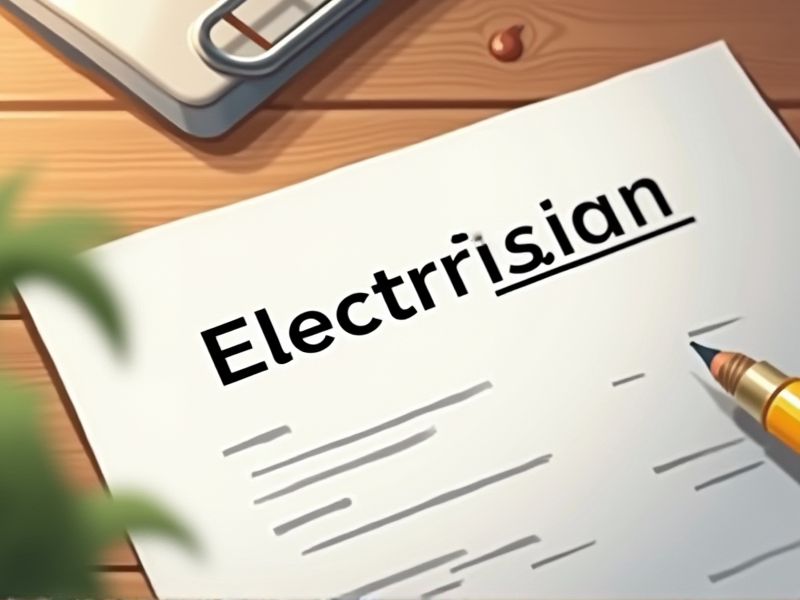
Becoming a licensed electrician requires certifications that ensure the individual possesses the necessary skills and knowledge for safe and effective electrical work. Without these certifications, the risk of electrical hazards such as fires or electrocution increases, potentially endangering lives and property. The certifications also facilitate regulatory compliance and enhance professional credibility in the field. Here are some important certifications you may need as a licensed electrician.
Journeyman Electrician License
The Journeyman Electrician License is essential because it demonstrates a verified level of expertise and competence in handling electrical systems. Licensing ensures adherence to safety standards, reducing risks of accidents and electrical fires. It acts as a validation of skills, increasing employer trust and expanding job opportunities. Possession of this license is often a legal requirement for practicing electricians in many regions, ensuring regulatory compliance.
Master Electrician License
Acquiring a Master Electrician License often leads to increased earning potential, as it allows electricians to supervise projects and apprentice electricians. A licensed electrician must have this certification to pull permits and ensure compliance with local regulations and codes. It can improve job stability and open opportunities for leadership or managerial roles within electrical firms. Holding this license signifies advanced knowledge and expertise that can attract more clients or business contracts.
OSHA 10-Hour Construction Safety Certification
The OSHA 10-Hour Construction Safety Certification provides electricians with essential knowledge about preventing common workplace hazards, minimizing the risk of accidents on job sites. This certification enhances an electrician's understanding of safety protocols, leading to a safer work environment and potentially reducing the incidence of work-related injuries. Requiring this certification also ensures compliance with federal and state safety regulations, protecting both workers and employers from legal liabilities. Possession of the OSHA 10-Hour certification can make an electrician more competitive in the job market, as employers often prefer candidates who demonstrate a commitment to safety standards.
OSHA 30-Hour Construction Safety Certification
Electricians face numerous on-site hazards, and OSHA 30-Hour Construction Safety Certification provides them with in-depth knowledge about maintaining a safer work environment. Understanding OSHA standards helps reduce the risk of accidents, thus ensuring compliance with worksite regulations. The certification enhances credibility, which can be a decisive factor for employers in a competitive industry. It also empowers electricians to identify potential safety hazards, leading to proactive measures that contribute to overall project safety.
NFPA 70E Electrical Safety Certification
NFPA 70E Electrical Safety Certification is essential because it ensures that licensed electricians are knowledgeable about electrical safety standards, minimizing the risk of workplace accidents. Compliance with these standards is often a legal requirement, helping companies avoid penalties and legal liabilities. The certification highlights a commitment to safety, improving client trust and potentially leading to more job opportunities. Regular updates in the certification process ensure electricians stay informed about the latest safety practices and technological advancements.
NICET Level I/II Certification
Licensed electricians seeking NICET Level I/II Certification often aim to enhance their credentials, as it signifies advanced proficiency in specialized areas such as fire alarm systems. This certification can lead to greater job opportunities and potentially higher pay since employers value the assurance of demonstrated competency. By having NICET certification, electricians can assure clients and employers of their commitment to maintaining industry standards. Regulatory measures in certain jurisdictions may require such certification to ensure safety and compliance in complex electrical systems.
National Electrical Code (NEC) Certification
NEC Certification ensures that licensed electricians understand and abide by the safety standards critical for preventing electrical hazards. This certification helps maintain consistency in electrical installations, minimizing the risk of fire or electrocution. Regulatory compliance with the NEC is often a legal requirement for electrical work permits. A certified understanding of NEC standards enhances an electrician's credibility and employability in a competitive job market.
Certified Electrical Safety Compliance Professional (CESCP)
The CESCP certification ensures that licensed electricians have an advanced understanding of electrical safety standards and regulations. This additional credential often leads to improved job performance because certified professionals are more aware of risk mitigation strategies. Employers frequently prefer or require CESCP-certified electricians as they reflect a commitment to adhering to safety compliance. Improved safety knowledge ultimately reduces workplace accidents, benefiting both the worker and the organization financially and ethically.
First Aid/CPR Certification
Electricians are often required to work in environments where the risk of electrical shock and other accidents is high, necessitating First Aid/CPR certification to ensure immediate response capability. This certification equips electricians with the skills to manage cardiac or respiratory emergencies effectively while waiting for emergency medical services. Many regulations and employers mandate CPR certification to enhance workplace safety standards and worker preparedness. Knowledge in First Aid/CPR fosters a safety-focused work culture, potentially reducing accident-related fatalities and boosting team confidence.
EPA Lead Renovation, Repair, and Painting (RRP) Certification
The EPA Lead Renovation, Repair, and Painting (RRP) Certification is essential for licensed electricians because it ensures they can safely manage lead-based paint disturbances in homes built before 1978. Without this certification, electricians may unknowingly release harmful lead dust during renovations, posing health risks to occupants. The certification also aligns electricians with federal regulations, reducing potential legal liabilities. By having the RRP Certification, electricians demonstrate their commitment to safe work practices, which can enhance their reputation and client trust.
Summary
By pursuing additional certifications, you can enhance your expertise and credibility in the electrical industry. This usually leads to increased job opportunities and potentially higher earnings. Employers prioritize candidates with specialized skills, and this can place you ahead in competitive hiring scenarios. Expanded knowledge from certifications also allows you to tackle complex projects, boosting your professional satisfaction and growth.
